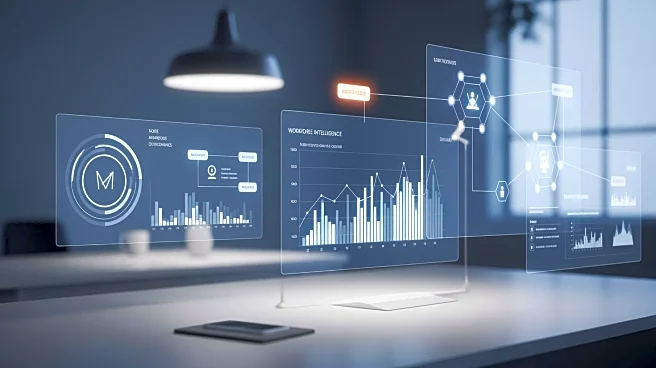What's Happening?
The HR Analytics & Workforce Intelligence market is experiencing substantial growth, driven by the increasing adoption of digital HR solutions and predictive analytics. According to recent market studies,
the sector is projected to expand at a compound annual growth rate (CAGR) of 10.8% from 2025 to 2032, growing from $8.7 billion in 2025 to $19.3 billion by 2032. Key players in the market include Visier, Tableau, SAP SuccessFactors Analytics, Workday People Analytics, and others. These companies are leveraging data models, dashboards, and predictive insights to optimize hiring, engagement, productivity, and retention. The market is segmented by types such as predictive analytics, workforce planning, and employee engagement analytics, and by applications including corporates, SMEs, remote teams, HR departments, and startups.
Why It's Important?
The growth of the HR Analytics & Workforce Intelligence market is significant for several reasons. It reflects a broader trend towards digitalization in HR practices, which is crucial for organizations aiming to enhance workforce management and strategic planning. The adoption of predictive analytics and AI-driven HR decisions can lead to improved employee engagement, talent optimization, and performance tracking. This shift is particularly important in addressing talent shortages and optimizing workforce productivity. Organizations that effectively implement these technologies stand to gain a competitive edge in talent management and operational efficiency, while those that lag may face challenges in maintaining workforce engagement and retention.
What's Next?
As the market continues to grow, companies are likely to invest more in advanced HR technologies and analytics tools. This could lead to further innovations in predictive workforce planning and AI-driven HR strategies. Organizations may also focus on overcoming challenges such as data privacy concerns, integration issues, and model accuracy to fully leverage the benefits of HR analytics. Additionally, there may be increased demand for customized solutions tailored to specific industry needs, driving further segmentation and specialization within the market.
Beyond the Headlines
The expansion of HR Analytics & Workforce Intelligence has deeper implications for workplace culture and employee relations. As organizations increasingly rely on data-driven insights, there may be shifts in how employee performance is evaluated and how talent is managed. This could lead to changes in organizational structures and decision-making processes, emphasizing evidence-based strategies. Moreover, the integration of AI and predictive models in HR practices raises ethical considerations regarding data privacy and the potential for bias in algorithmic decision-making.










